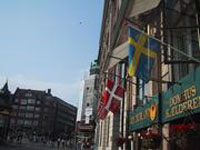The economic gap between men and women is the smallest in the Nordic countries, with Sweden at the top of the list, a new report has shown.
Women in Sweden, Norway, Iceland, Denmark and Finland are most likely to get equal wages and job opportunities compared to men, according to a World Economic Forum (WEF) study.
However, none of the countries listed in the study has closed the gender cap completely. The EU scores well, as 10 of its members are in the top 15. The UK and Germany are in 8th and 9th place respectively, with France 13th.
Latvia (11th), Lithuania (12th) and Estonia (15th) have the best results amongst the new member states. The US has missed the top 15, ranking 17th.
It is not surprising that the Nordic countries top the list, as they are characterised by "strongly liberal societies, protection of minority rights and comprehensive welfare systems", reads the WEF report.
"The experience of the Nordic countries provides a useful benchmark for comparison purposes – an excellent example of the fact that concerted efforts over time will yield lasting results", Augusto Lopez-Claros, Chief Economist and Director of the Global Competitiveness Programme at the World Economic Forum, said in a statement.
"These societies seem to have understood the economic incentive behind empowering women: countries that do not fully capitalise on one-half of their human resources are clearly undermining their competitive potential", he added.
Worst performers
At the other end of the list, Malta (43rd), Italy (45th) and Greece (50th) rank lowest among EU members. Italy and Greece are doing particularly badly in the fields of economic participation and economic opportunity, due to the countries' "patriarchal cultures", according to the report.
Non-EU member Switzerland (34th) also performs badly in these fields. Moreover, it lags behind in educational attainment. This makes it one of "the very few developed nations where female enrolment rates are consistently lower than male rates".
Turkey, which is set to start membership talks with the EU on 3 October, is at second bottom, followed only by Egypt.
The WEF study covers 58 countries, including 28 "emerging markets". Its criteria are economic participation, economic opportunity, political empowerment, educational attainment and health and well-being.




 By: N. Peter Kramer
By: N. Peter Kramer
